Probiotics – Simple Ways to Support Your Gut
If you’ve ever felt bloated after a big meal or caught a cold that just won’t quit, chances are your gut could use some friendly help. Probiotics are live microbes that live in your intestines and do the hard work of balancing digestion, fending off bad bacteria, and even nudging your immune system in the right direction. Think of them as tiny teammates that keep everything running smoothly.
Why probiotics matter for your gut
When the good bacteria outnumber the bad, you notice better regularity, less gas, and a calmer stomach after dairy or spicy foods. Studies show that specific strains can ease occasional constipation, reduce symptoms of irritable bowel syndrome, and even lower the risk of some infections. It’s not just about comfort – a balanced gut influences mood, skin health, and how well you absorb nutrients like vitamins B12 and K.
How to pick the right probiotic supplement
Not all probiotics are created equal. Look for a product that lists the exact strains (like Lactobacillus rhamnosus GG or Bifidobacterium longum) and shows a CFU count of at least 5 billion per serving. Multi‑strain formulas cover more bases, but if you have a specific issue—say occasional diarrhea—a targeted strain may work better.
Check the label for storage instructions; some need refrigeration while others are shelf‑stable. Also, make sure the expiration date is within two years so the bacteria stay alive when you take them.
Start with a low dose (one capsule) and see how your body reacts. Most people feel the benefits after a week or two, but it can take up to a month for the gut community to fully adjust. If you notice any stomach upset, try taking the probiotic with food instead of on an empty stomach.
Besides pills, you can load up on natural sources. Yogurt with live cultures, kefir, sauerkraut, kimchi, and tempeh all deliver a variety of strains without a prescription. Aim for a serving or two daily if you enjoy these foods; they’re an easy way to keep the bacterial party going.
Remember that probiotics work best when paired with prebiotic fibers—foods like bananas, onions, garlic, and whole grains that feed the good bacteria. A balanced diet high in fiber helps the microbes settle in and do their job longer.
If you’re pregnant, immunocompromised, or have a serious health condition, check with your doctor before starting any new supplement. The right probiotic can be a game‑changer for daily comfort, but it’s always smart to get professional guidance when needed.
Best Alternatives to Flagyl for Bacterial Vaginosis in 2025: Secnidazole, Clindamycin, and Probiotics
Flagyl isn’t the only line of defense against bacterial vaginosis anymore. Dive deep into the latest options—secnidazole, clindamycin, and probiotics—and see what actually works in 2025. Get tips, key facts, and genuine advice for making the best choice if Flagyl isn’t for you. This article brings clear, straight-talking info for anyone looking for real solutions to bacterial vaginosis today.
About
Health and Wellness
Latest Posts


Muscle Aches from Statins: What Really Causes It and What to Do
By Orion Kingsworth Jan 9, 2026

Buy Cheap Generic Bactrim Online - Safe Pharmacy Guide 2025
By Orion Kingsworth Sep 30, 2025

Computer Vision Syndrome: Proven Ways to Prevent Digital Eye Strain
By Orion Kingsworth Dec 15, 2025

